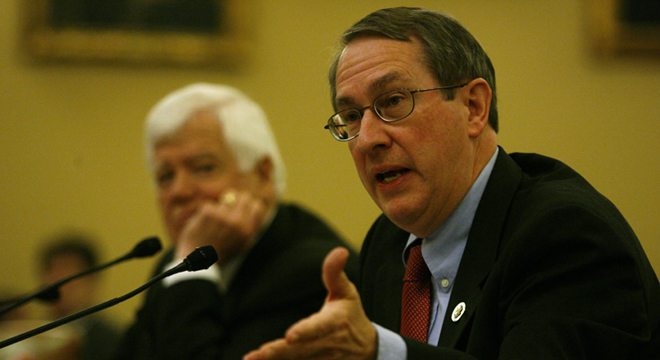Tension was palpable on Tuesday at the House’s first hearing on immigration reform, held by the Judiciary Committee, as Republican lawmakers sought to explore middle ground between a swift pathway to citizenship that pro-immigration advocates prefer, and the status quo of massive numbers of undocumented people who are depressing working class wages.
Whether Congress can agree on what to do about the roughly 11 million unauthorized immigrants in the country has been a sticking point for immigration reform. It’s a vexing political dilemma for Republicans in particular, who are caught between a conservative base that opposes an amnesty program and the need to win back Latino voters.
But the Republicans struggled to articulate what their ideal middle ground would be, if not a pathway to eventual citizenship for undocumented people who meet certain criteria.
“America is a nation of immigrants,” Judiciary Chairman Bob Goodlatte (R-VA) said in his opening statement. “But we are also a nation of laws.”
He quizzed Julián Castro — the mayor of San Antonio, a breakout star at the Democratic convention and a witness at the hearing — on that issue.
“I want to give you an opportunity the question of the day,” Goodlatte said, “and that is this: Are there options we should consider between the extremes of mass deportation and a pathway to citizenship for those not lawfully present in the United States?”
Castro said he doesn’t see a pathway to citizenship as “an extreme option,” pointing out that Congress has previously chosen that option and arguing that it has worked.
“I would disagree with that characterization of that as the extreme,” Castro said. “The extreme I would say just to fill that out, would be open borders. Nobody agrees with open borders. Everyone agrees that we need to secure our border.”
Goodlatte wasn’t convinced. Neither was Rep. Lamar Smith (R-TX), the committee’s former chairman, who wrestled with the same question, asking Castro: “Do you see a compromise between the status quo and a path to citizenship?”
Castro responded that the program will be “earned citizenship” that involves paying a fine, paying back taxes, going through a background check and waiting in line — the blueprint put forth by the so-called Gang of Eight bipartisan senators recently. Smith pressed Castro on whether the end result of citizenship should be guaranteed.
“I believe that’s the best option,” the Democratic mayor said, adding that “going forward, of course, enforcement is part of the conversation.” He added that a guest worker program that meets the needs of employers could also be part of a compromise.
“What we cannot become is a nation where the law is enforced selectively or not at all. What we cannot become is a country where the laws apply to some people some of the time,” said Rep. Trey Gowdy (R-SC), the chairman of the Judiciary Border Security subcommittee. “So, we seek to harmonize two foundational precepts: humanity and respect for the rule of law.”
That skepticism from Republicans was on display throughout the hearing. While Democrats focused on the need to bring the 11 million illegal immigrants out of the shadows, GOP lawmakers expressed more interest in overhauling the legal immigration system and enforcing existing laws, in part by making it easier for high-skilled workers to achieve permanent legal status.
Rep. John Conyers (MI), the top Democrat on the committee, argued that resolving the issue is more about political will than anything else — and sounded an optimistic tone.
“It has never been about what comprehensive immigration reform will entail,” he said. “Rather, it has been about how we will pass a bill through Congress. And, I believe that the chances of passing a bill have never been better.”






